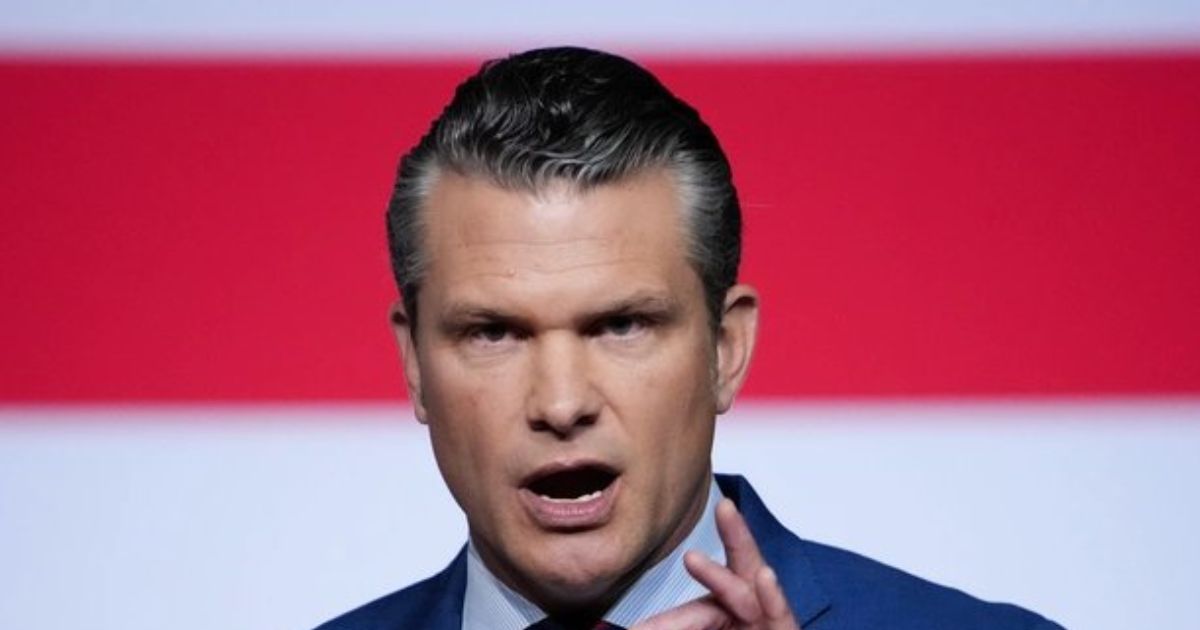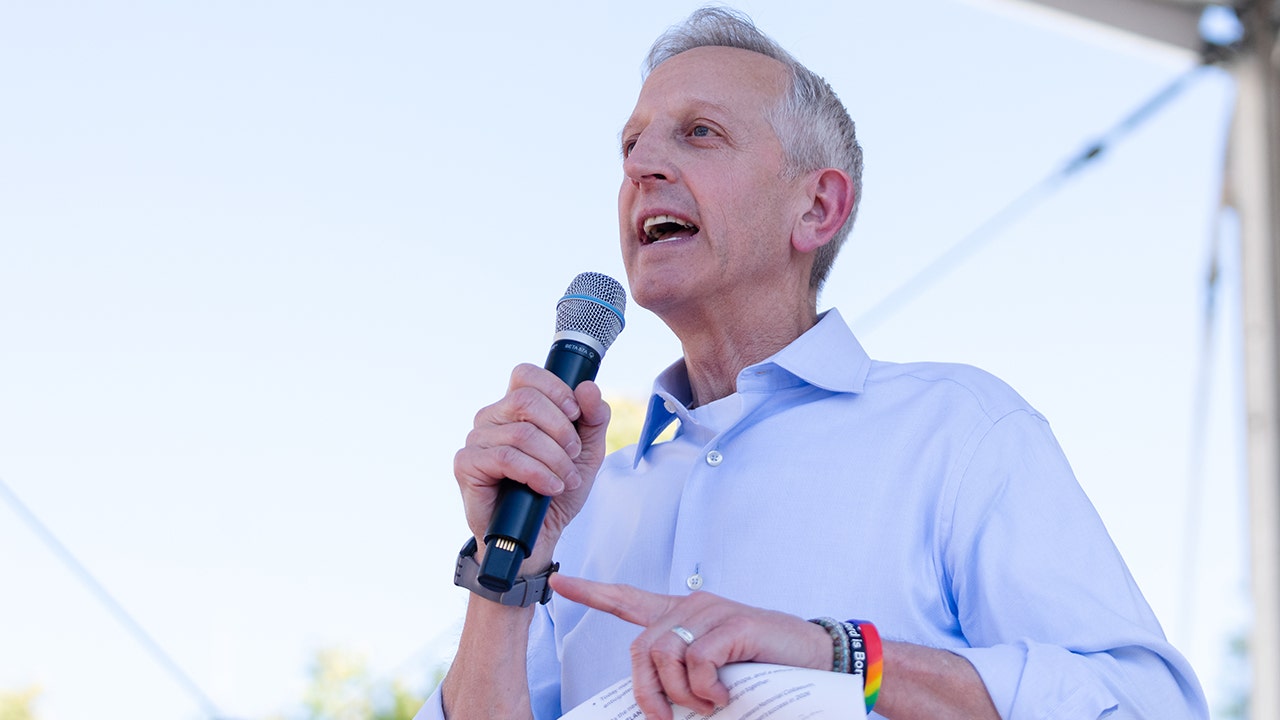Tag Archives: Pete Hegseth
Slingshot News: ‘Drop The Politics’: Patty Murray Catches Pete Hegseth Red-Handed For Selectively Hiring Trump Supporters In Senate Hearing [Video]
During a Senate Appropriations Committee hearing several months ago, Senator Patty Murray (D-WA) exposed Defense Secretary Pete Hegseth for reviewing new hires in the civilian workforce and selectively hiring only those who align with Donald Trump’s agenda.
Inquisitr: Pete Hegseth ‘First to Be Fired’ as Trump Reportedly Sets Departure Date
Defense Secretary Pete Hegseth may soon be out, as insiders warn Trump’s Pentagon chief is “on borrowed time.”
USA Today: MAGA balked at Team Trump’s Qatari air force base. So now it’s a ‘fake story.’ | Opinion
The official Trump administration message is that Qatar will have an air force base built in Idaho. Except, not really.
Slingshot News: ‘I Wrote About Osama Bin Laden’: Trump Shows Signs Of Dementia, Claims He Predicted 9/11 With Teenage Pete Hegseth In Remarks At Norfolk [Video]
During his remarks to Navy sailors at Naval Station Norfolk several days ago, Donald Trump claimed that he told Pete Hegseth about Osama bin Laden and 9/11 a year before it happened. Around that time, Hegseth was just 19 or 20 years old. Also, Trump did not predict 9/11.

Independent: ‘Secretary of War’ Pete Hegseth reacts after Laura Loomer shreds Qatari air force base in US
Speaking alongside Qatar’s Minister of Defense Friday, Hegseth announced deal to build a Qatari Emiri Air Force facility at the Mountain Home Air Force Base in Idaho
Secretary of Defense Pete Hegseth — who calls himself the War Secretary amid an administration rebranding of the Defense Department — issued a “clarification” after widespread criticism from MAGA supporters over the news that the U.S. will host a Qatari air force facility on American soil.
Speaking alongside Qatar’s Minister of Defense Sheikh Saoud bin Abdulrahman Al-Thani, Hegseth announced Friday, “Today, we’re announcing a letter of acceptance in building a Qatari Emiri Air Force facility at the Mountain Home Air Force Base in Idaho.”
The announcement sparked immediate backlash from conservative critics, most notably Laura Loomer, who has the ear of President Donald Trump, prompting Hegseth to post an “important clarification” on X later in the day.
“The U.S. military has a long-standing partnership w/ Qatar, including today’s announced cooperation w/ F-15QA aircraft. However, to be clear, Qatar will not have their own base in the United States—nor anything like a base. We control the existing base, like we do with all partners,” he wrote.
Despite the clarification, far-right activist Loomer doubled down on her remark that allowing people linked to Hamas to train on U.S. soil poses a national security threat.
“Nobody wants the funders of HAMAS in America being trained to fly fighter jets on US soil. A jihadist in a suit is still a jihadi. It’s a threat to our national security,” Loomer replied to Hegseth’s follow-up post.
Earlier Friday, Loomer called the plan “an abomination.”
“I don’t think I’ll be voting in 2026. I cannot in good conscience make any excuses for the harboring of jihadis. This is where I draw the line,” she wrote.
Former Trump adviser Steve Bannon and the Idaho Freedom Foundation also condemned the plan.
“There should never be a military base of a foreign power on the sacred soil of America,” Bannon told Newsweek.
The MAGA-friendly Idaho Freedom Foundation said on X, “To unilaterally decide that Idaho will host a foreign nation’s Air Force facility, which would house and train foreign nationals whose loyalties don’t align with our own national and state interests, is a completely unacceptable overreach.”
Meanwhile, the Qatari embassy confirmed that the training facility is part of a 10-year commitment to enhance interoperability between the two nations’ air forces. The embassy also noted that the project will create American jobs and support broader U.S.-Qatari military cooperation.
The establishment of the facility at Mountain Home Air Force Base, home to the 366th Fighter Wing, follows a precedent of hosting foreign military personnel for training. Similar arrangements have been made with other allies, such as Singapore, which has trained its pilots at the base since 1998.
The facility is expected to accommodate 12 Qatari F-15 jets and approximately 300 personnel.
In September, Trump signed an order pledging U.S. defense of Qatar if attacked and urged Israel’s leader to apologize for a deadly strike on a Qatari serviceman.
Earlier this year, Qatar’s royal family gave Trump a $400 million jet, which he said would eventually go to his presidential library.
.jpg?trim=0,0,0,0&width=1200&height=800&crop=1200:800)
There nothing that can’t be bought with a 747-sized bribe!
Fox News: Portland mayor orders removal of police tape despite federal demand for perimeter at ICE facility, report says
Portland Mayor Keith Wilson ordered the removal of police tape near a U.S. Immigration and Customs Enforcement facility this week despite the federal government’s call for the establishment of a perimeter around the ICE location, according to a report on oregonlive.com.
Homeland Security Secretary Kristi Noem visited the ICE facility on Tuesday and Portland Police Bureau Chief Bob Day noted that authorities had the vicinity cordoned off for the occasion.
But the perimeter was removed on Wednesday, according to the report.
According to the City of Portland, a message to Day from U.S. Attorney for the District of Oregon Scott Bradford stated, in part, that “all federal officers must be able to come and go from the ICE office without harassment or hindrance” and that “Portland must create a perimeter around the ICE office.” He specified that this “perimeter must be at least as large as the perimeter state and local police set up today for the Secretary’s visit.”
The city also indicated that in a message to General Counsel for DHS James Percival, Mayor Wilson noted, in part, “You have requested that federal officers be able to ingress and egress from the Immigration and Customs Enforcement facility without hindrance. The Mayor and our local public safety professionals will continue to evaluate the situation on the ground, and they will continue to make public order decisions based on what they believe will be in the best interest of Portland and our community.”
Fox News Digital reached out to the U.S. Attorney’s Office for the District of Oregon on Friday and to the City of Portland to request comments from Bradford and Wilson, respectively.
Last month, President Donald Trump called for deploying National Guard troops into Portland, but his plan has been stymied amid legal wranglings.
“At the request of Secretary of Homeland Security, Kristi Noem, I am directing Secretary of War, Pete Hegseth, to provide all necessary Troops to protect War ravaged Portland, and any of our ICE Facilities under siege from attack by Antifa, and other domestic terrorists. I am also authorizing Full Force, if necessary,” he declared in a September Truth Social post.
Slingshot News: ‘It Depends’: Pete Hegseth Looks Down On Women, Refuses To Admit They Are Capable Of ‘Causing Death’ During Tense Exchange In Hearing [Video]
During a Senate Armed Services Committee hearing several weeks ago, Congresswoman Chrissy Houlahan (D-PA) asked Defense Secretary Pete Hegseth if women are capable of causing death. Hegseth refused to give a straightforward answer to a straightforward question.

Slingshot News: ‘They Jokingly Call Me That’: Trump Gets Caught Up In Another Lie, Says Europeans Call Him The ‘President Of Europe’ In Oval Office Remarks
During an executive order signing event several weeks ago in the Oval Office, Donald Trump boasted about this imaginary popularity in Europe, claiming that Europeans jokingly call him the “President of Europe” because they “respect” him so much.

Slingshot News: ‘The Best Physical Specimen Of The Three’: Trump Gets Lost In His Delusions, Believes He’s ‘Healthier’ Than Bush And Obama
During his remarks at Naval Station Norfolk yesterday, Donald Trump praised disgraced doctor and Congressman Ronnie Jackson (R-TX) for publicly stating that he’s healthier than former Presidents George Bush and Barack Obama.




